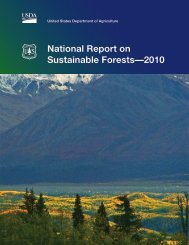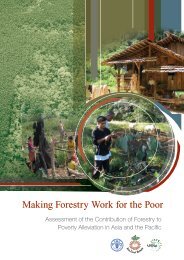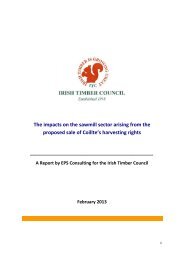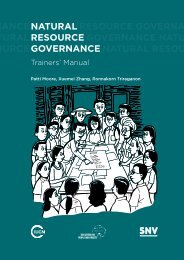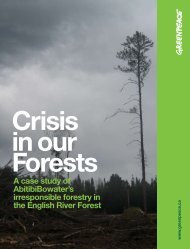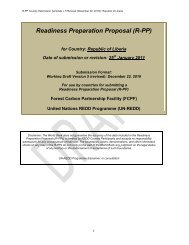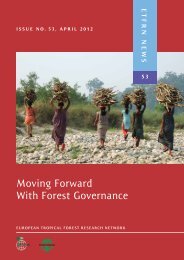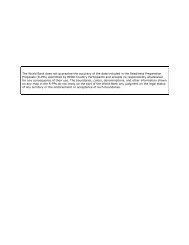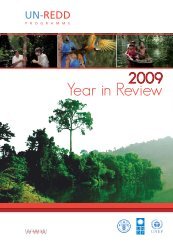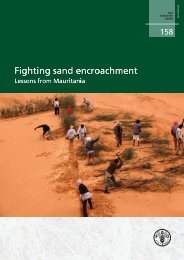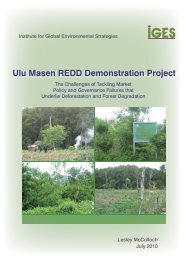pdf 1242 KByte - JIKO
pdf 1242 KByte - JIKO
pdf 1242 KByte - JIKO
You also want an ePaper? Increase the reach of your titles
YUMPU automatically turns print PDFs into web optimized ePapers that Google loves.
Policy Paper: Assessing prerequisites for market-based REDD+ activities 25<br />
3.3.4 Existing Experiences from ongoing readiness initiatives<br />
Bi- and Unilateral Initiatives<br />
Among the main agents of deforestation in Brazil are the expansion of extensive cattle farming and agriculture.<br />
The underlying causes of these activities became apparent in 2007, when commodity price increases led<br />
to a significant increase of deforestation. Under the Action Plan for the Prevention and Control of Deforestation<br />
in the legal Amazon the federal government responded with a Decree that allowed to implement several<br />
activities to decouple the rise of cattle and soy prices and attenuate the increasing deforestation activities.<br />
Rural landholders in those counties with the largest deforestation rate were required to present a current description<br />
of their holdings and land use, with those failing to comply with the requirement having their access<br />
to government agricultural credit blocked. The decree further required state and environmental agencies<br />
to embargo illegally deforested landholdings, prohibiting the sale and purchase of goods from embargoed<br />
areas. This experience from Brazil highlights the importance of detecting the underlying causes of deforestation<br />
and its cross-ministerial mitigation activities as well as the significance of high-level support for forest<br />
protection activities (EDF 2009).<br />
With the Amazon Fund administered by the Brazilian Development Bank (BDES), a separate national fund<br />
has been established to complement national efforts in reducing deforestation with funding from developed<br />
country governments and private companies. The Fund has attracted considerable attention due to its performance-based<br />
approach. However, the performance-based distribution of funding has since been limited to<br />
the national level, while the disbursement system at the project level functions similarly to traditional conservation<br />
trust funds (Caravani 2011). The fund supports projects in several areas, including management of<br />
public forests, sustainable forest management and environmental control, monitoring and inspection. Up to<br />
20% of the fund can be used to support the development of monitoring systems in areas beyond the Amazon<br />
biome (Amazon Fund 2011). By January 2012 US$ 37,8 million have been disbursed (Fundo Amazônia<br />
2012).<br />
FCPF<br />
Component two of the template for developing a R-PP requires countries to carefully analyse their national<br />
situation and to identify the drivers as well as the underlying causes of deforestation (FCPF 2011b). Countries<br />
however often need analytical support to successfully fulfil these requirements and to select the appropriate<br />
policies. FCPF countries such as Guyana and DRC have therefore mobilized foreign expertise in the<br />
process of writing their R-PPs and conducted trainings to improve analytical capacities (FCPF 2010).<br />
FCPF experiences highlight the need to consider combined policy approaches for tackling deforestation in<br />
areas with diverse drivers of deforestation within one country. Nepal’s government is for example proposing<br />
community-based programmes in the country’s middle hills, where the forests are exploited for fuel wood<br />
and building material by villagers but is exploring other approaches in the lowland region, where agricultural<br />
expansion and immigration are the main drivers (FCPF 2010). The capacities to select the appropriate policies<br />
by taking into account factors such as opportunity costs to produce monetary estimates are currently not<br />
existent in many countries. Several FCPF countries are however integrating such factors in their R-PPs with<br />
the assistance from external consultants (FCPF 2010).<br />
Nicolas Kreibich, Christof Arens and Wolfgang Sterk<br />
Wuppertal Institute




